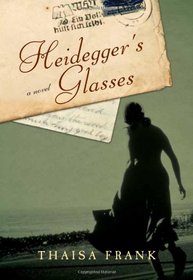A trunk was filled w/mementos from the various scribes of the underground compound in Germany during World War II. The trunk later travels to a Russian refuge camp, across the Atlantic to New Jersey toa sister of one of the scribes relative. The relative begins to unfold stories and a historical writing from the mementos within the trunk. Her connection with a German who was involved during the war help the relative to put many of the mementos into a museum in Manhattan, New York relating to World War II. A compelling, at times horrifying writing of a historical era of time. A great read.
Getting into this story took a bit of doing for me but I found that I really liked and admired Elie Schacten and Gerhardt Lodenstein, the lovers, who are the key characters in this novel. Their goal is to save as many people as they can from the Nazis death squads and camps..
The book's premise is based on a program instituted by the Reich called Briefaktion, or Operation Mail. Jews who were taken to Auschwitz were required to write postcards or letters to home indicating that they were safe and well. Instead, these messages were usually a prelude to their deaths. In Frank's novel, a center of scribes are instructed to answer the letters to the dead.
Meanwhile Lodenstein and Elie struggle to rescue many, feed and house those in the compound. All is normal (as normal as it can get) until Heidegger's wife meets with Nazi leaders insisting that her husband get a pair of glasses. Trouble is he expects them to come from a close friend who is Jewish and imprisoned in a concentration camp. There is much jockeying and shifting by many characters to rescue the friend who can make the glasses as well as his son.
They story is quick moving and so easy to read. A number of reviewers called the novel mythical and/or surreal. I guess it is because the environments, the forest and the trips to rescue others, obtain food, clothing and fuel are too real. It's a good, good read and emphasizes once again that we who live in a free world need to appreciate how much we have.
The book's premise is based on a program instituted by the Reich called Briefaktion, or Operation Mail. Jews who were taken to Auschwitz were required to write postcards or letters to home indicating that they were safe and well. Instead, these messages were usually a prelude to their deaths. In Frank's novel, a center of scribes are instructed to answer the letters to the dead.
Meanwhile Lodenstein and Elie struggle to rescue many, feed and house those in the compound. All is normal (as normal as it can get) until Heidegger's wife meets with Nazi leaders insisting that her husband get a pair of glasses. Trouble is he expects them to come from a close friend who is Jewish and imprisoned in a concentration camp. There is much jockeying and shifting by many characters to rescue the friend who can make the glasses as well as his son.
They story is quick moving and so easy to read. A number of reviewers called the novel mythical and/or surreal. I guess it is because the environments, the forest and the trips to rescue others, obtain food, clothing and fuel are too real. It's a good, good read and emphasizes once again that we who live in a free world need to appreciate how much we have.




